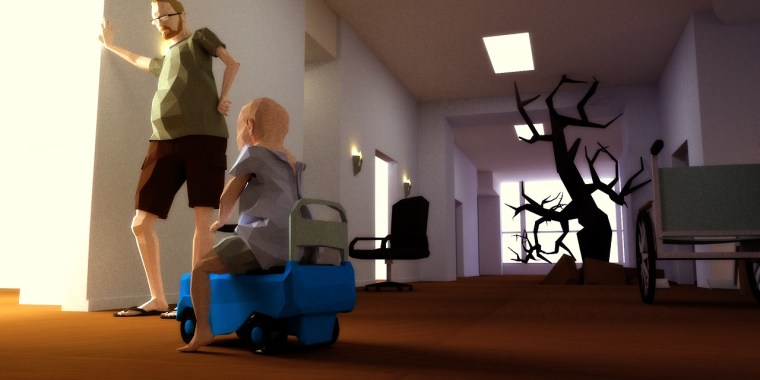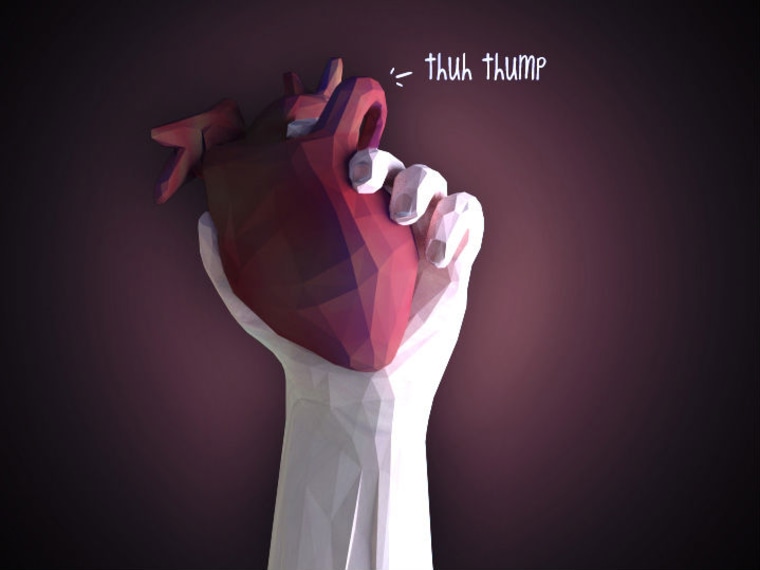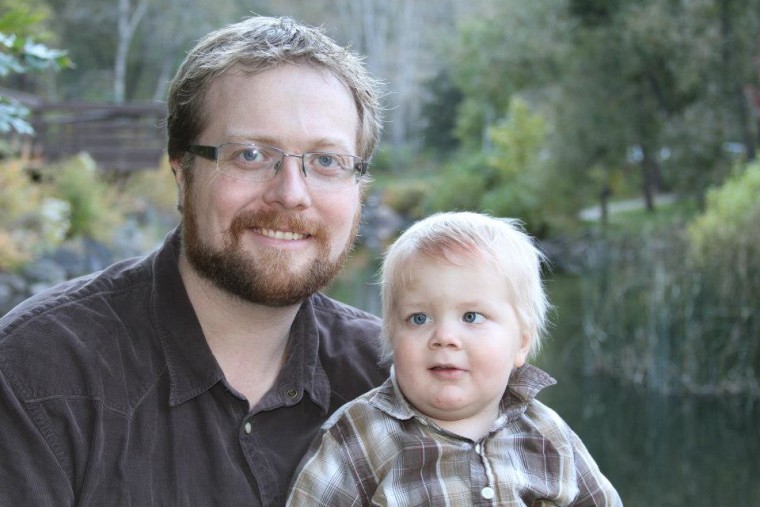For the father of a child with cancer, reality can be a lot to bear. When Ryan Green's son Joel was first diagnosed with a rare and deadly form of the disease, Green turned to something that he knew could give him some relief: video games.
No, he didn't disappear into his basement to play "World of Warcraft" or "Call of Duty." Green, a veteran programmer who had worked on video games, began to work to turn his experience raising Joel into a piece of interactive storytelling he could share with the world.
The game, "That Dragon, Cancer," puts players in Green's shoes as he negotiates the tenuous and emotionally fraught relationship with his young child. Green and co-developer Josh Larson let me play through one level set during what Green said was one of Joel's "worst nights" at the hospital. He was crying due to dehydration, but was too sick to actually drink anything.
The "gameplay" in the level, if you can call it that, is decidedly simple by modern video game standards. You point and click on a variety of objects in the room to do things like pick up a juice box, hold Joel in your arms, or stare out the window. There is no clear goal or objective in the level. The game's version of Green says repeatedly that he's trying to help Joel stop crying. But picking Joel up to cradle him only makes him wail louder, while trying to get him to drink more juice will only make him throw it back up. Eventually, the only way to "beat" the level is to approach the window and press a button to pray.
Green and Larson both admit that even the most seasoned gamers might be disturbed when they realize they can't simply "win" this level by battling some final boss or shooting at a group of hungry zombies. But this discomfort is part of the point — by allowing player to fail in a certain sense, they believe they can give a more realistic depiction of what struggling with a chronic illness is like.
"I'm asking you to walk along with me," Green said. "I want to show people what the face of fear looks like."
He adds, "I want people to love my son like I love my son."
Green also wants to show players and fellow game developers alike that "games, of all mediums, should reflect life."
Soon after Joel was diagnosed with an atypical teratoid rhabdoid tumor, a rare and deadly cancer that can develop in early childhood, the doctor told Green and his wife Amy that their son, then just 1 year old, likely only had four months to live. Now age 4, Joel has beaten initial expectations, but the battle is not over. Joel is currently grappling with his ninth tumor.
Next year, the Loveland, Colo.-based Green will release "That Dragon, Cancer" exclusively for the new Ouya Android gaming console.

'Empathy games'
"That Dragon, Cancer" is part of an emerging trend of game developers beginning to produce so-called "empathy games" — smaller, more intimately focused video games that attempt to portray realistically a particular aspect of the human experience.
"Papo Y Yo," a game released last summer as part of Sony's Pub Fund, a program to foster self-published and independent games, tells the story of its creator Vander Caballero's childhood growing up with an alcoholic and abusive father in a Brazilian favela. "Papers, Please," an indie game released earlier this month, puts players in the position of a lowly immigration inspector working at a border checkpoint in the fictitious Eastern European country of Arstotzka. "Depression Quest," a text adventure released earlier this year for free online, guides its players through the experience of living with chronic clinical depression.
If these games have one thing in common, it's their aversion to the pomp and circumstance of over-the-top video games that have come to define the medium. For Ian Bogost, a professor of media studies at the Georgia Institute of Technology, that's also what makes them so exciting.
"Different experiences are interesting!" Bogost told NBC News. "I mean, is that even news? This is why people read books or watch television or appreciate any other kind of art."

Given how young video games are compared to film or television, creators are still figuring out how to best communicate human stories in their work. And — as Green and others can tell you — because this game genre is least likely to turn a profit, early attempts are done most often by amateur game developers or ones working independently from top tier publishers and studios. "Depression Quest" for instance, was made with Twine, a tool for writing interactive fiction that's available for free online.
Even Bogost acknowledged that while early coverage of "That Dragon, Cancer" has been positive, very few people have ever played it. It exists more as an idea, he suggested, than an actual piece of work.
This is a problem Green and Larson are wary of. They wouldn't go into much detail about their new deal with the Ouya team except to say that they would be able to complete development of "That Dragon, Cancer" with the company's support. And while Green said that he plans to add more features like additional interactive elements to the final game, he admitted that working on a game like this is, well, hard for him — especially since he's also still living through the experience of raising his son, cancer and all.
When it comes to trying to make any sense of his family's predicament, to answer why this is happening, Green is philosophical. "It's something that's hard to answer," he said. "But that's why we're making a game out of it."
Yannick LeJacq is a contributing writer for NBC News who has also covered technology and games for Kill Screen, The Wall Street Journal and The Atlantic. You can follow him on Twitter at @YannickLeJacq and reach him by email at: Yannick.LeJacq@nbcuni.com.
